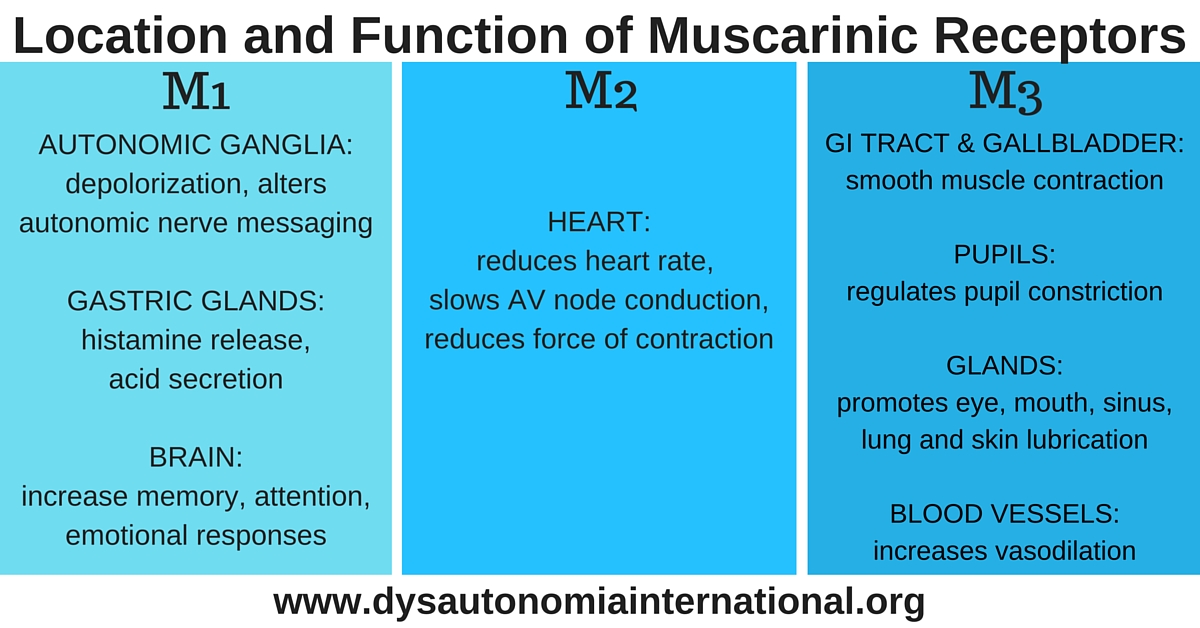M1and M2 Muscarinic receptor antibodies among patients with Postural Orthostatic Tachycardia Syndrome: potential disease biomarker
Pilot study described here:
https://www.texasneurologist.org/AM...leTypeCode=PDF&iFileName=9_Divyanshu_Abstract
Larger replication study recruiting from Dysautonomia International conference:
http://www.dysautonomiainternational.org/page.php?ID=240
Pilot study described here:
https://www.texasneurologist.org/AM...leTypeCode=PDF&iFileName=9_Divyanshu_Abstract
Larger replication study recruiting from Dysautonomia International conference:
http://www.dysautonomiainternational.org/page.php?ID=240
Muscarinic Antibody Research Study Planned for
2016 Dysautonomia International Conference
Dysautonomia International has partnered with UT Southwestern to conduct a research study during the Dysautonomia International 2016 Conference. Dr. Steven Vernino, the world's leading expert in autoimmune disorders that impact the autonomic nervous system, will screen POTS patient volunteers for three different muscarinic receptor antibodies. These antibodies are known to be associated with dysautonomia, and were found in more than 87% of POTS patients in a preliminary study conducted by Dr. Vernino's lab. A larger study is needed to confirm and expand upon the preliminary findings. With your support, we can make it happen this July!
For the past few years, Dysautonomia International has invited researchers to conduct POTS research projects at our annual conference in Washington, DC. This year's conference study will evaluate 150 POTS patients and 25 healthy controls for three muscarinic receptor antibodies known to be associated with various forms of dysautonomia (M1, M2, and M3).

The study will be led by Dysautonomia International Medical Advisory Board member, Steven Vernino, MD, PhD. Dr. Vernino is the Dr. Bob and Jean Smith Foundation Distinguished Chair in Neuromuscular Disease Research and a Professor of Neurology and Neurotherapeutics at UT Southwestern Medical Center in Dallas. "This study will investigate the possibility that some patients with POTS have specific antibodies that affect autonomic function. These antibodies may also help determine if there is a link between POTS and other autoimmune diseases like Sjogren's syndrome," explains Dr. Vernino.
Muscarinic receptors are part of the parasympathetic nervous system. When antibodies bind to these receptors, this may cause problems with parasympathetic nerve messaging, which can lead to dysautonomia symptoms. Muscarinic receptor antibodies have previously been associated with other forms of dysautonomia that may have an autoimmune basis, like Chagas disease, Sjogren's syndrome, and idiopathic tachycardia.
In a preliminary study of 16 POTS patients and 20 controls, Dr. Vernino's lab recently found that more than 87% of POTS patients had one or more of the muscarinic antibodies. The research team also found that M1 was associated with cognitive impairment ("brain fog") and M3 was associated with an abnormal QSART (a test that measures small fiber autonomic nerve function in the limbs). In the upcoming study, we hope to improve the method for measuring muscarinic antibodies, validate these findings, and obtain additional information by repeating this study on a larger group of POTS patients during the 2016 conference.
Identifying the percentage of POTS patients that have these antibodies and comparing the antibody profiles to patient reported symptoms is the first step in understanding how these antibodies impact POTS patients, which will lay the foundation for future research seeking to identify new treatments.
M1and M2 Muscarinic receptor antibodies among patients with Postural Orthostatic Tachycardia Syndrome: potential disease biomarker
Authors: Divyanshu Dubey, Steve Hopkins, Steven Vernino Department of Neurology & Neurotherapeutics, UT Southwestern Medical Center, Dallas, Texas
Background: Postural tachycardia syndrome (POTS) is characterized by exaggerated orthostatic tachycardia. Etiopathogenesis of POTS still remains unclear. We tested the hypothesis that patients with POTS have serum muscarinic receptor antibodies which may be contributing to clinical syndrome.
Methods: Sixteen POTS patients and twenty controls were examined for M1, M2 and M3 receptor antibodies by cell-based assay (immunofloresence staining of CHO-K1 cells transfected with cDNA encoding M1, M2 and M3 receptors). The patients were selected based on clinical presentation and results of Autonomic testing (significant elevation of heart rate on tilt table testing). Untransfected CHO-K1 cells were also used as negative controls. Visual determination of positive or negative immunofloresence was done by two independent observers. Quantification of florescence was performed using Image J software. Patients’ demographic, clinical and laboratory data was also collected.
Results: Of the 16 POTS patients, 15 were females, while 55.5% (10) of controls were females. Among the controls; 4 were normal individuals; the remaining 16 had an underlying neurological conditions (cholinergic autonomic neuropathy, autoimmune epilepsy, LambertEaton syndrome, non-specific dysautonomia, Multi-System Atrophy). Significantly higher proportions of POTS patients had M1 (87.5% vs 10%, p<0.001) and M2 (68.75% vs 15%, p<0.005) muscarinic receptor antibodies compared to the controls. M3 muscarinic receptor antibodies were detected in two POTS patients and two controls. Image J analysis also showed that serum from POTS patients had significantly higher florescence on M1 (p<0.01, CI 8.38-8.45) and M2 (p<0.001, CI 4.74-4.80) transfected cell lines compared to the controls. There was also a significantly higher florescence of POTS patients’ serum on M1 (p<0.001, CI 7.01-7.44) and M2 (p<0.001, 3.01-3.37) transfected cell lines compared to untransfected CHO-K1 cells. Among the patients who had autonomic testing (20), presence of M3 receptor antibody was associated with abnormal QSART results (p<0.01). A high proportion (66.67%) of patients with cognitive changes had detectable M1 muscarinic receptor antibody (p=0.245). Among these 16 POTS patients, only 3 reported preceding infection or viral prodrome before symptom onset. Most of the patients (68.8%) had gradual (>3 months) onset and progression of symptoms.
Conclusion: M1 and M2 receptor antibodies can be detected in significant number of POTS patients. These antibodies may play an important role in the etiopathogenesis of this clinical syndrome, but further studies are needed to determine the significance of these antibodies.
